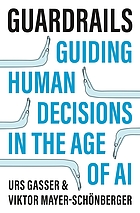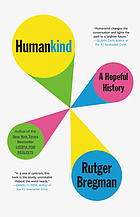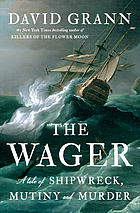Here is The Friday List! Every week, new books are arriving at RLB Library and to keep you up-to-date on what has come in, we’ll be posting the most recent 30 days of arrivals every Friday. The link below will take you to a catalog listing so that you can explore and find titles that interest you. Be sure to check back regularly to see what else has arrived!
THE FRIDAY LIST
If you want some ideas on what to read, here are some highlights, which can be found in the New Books kiosk by the information desk on the first floor of the library (eBooks can be accessed through the RLB website):

Guardrails : guiding human decisions in the age of AI, Urs Gasser and Viktor Mayer-Schönberger, 2024
In making decisions-be they decisions for ourselves, our families, our work, or our government-our thinking is informed by a host of factors that include the information we have on hand, the societal norms exerting pressure in one direction or another, the laws that govern us, and, increasingly, the technology that can bring the power of algorithms, AI, and computing to our aid. Viktor Mayer-Schönberger and Urs Gasser term this overarching set of external influences “guardrails”: the structures, much like the same-named barriers on highways, that establish the bounds and direction of desirable behavior. As technology has come to play an outsized role in shaping our decision-making, the authors argue that a clear understanding of what role guardrails can and should play in our society is essential-and that this in turn can help us determine what kind of transparency and accountability we require of the technology we rely on. The authors first consider some of the challenges of decision-making in the digital world in chapters that focus on information and misinformation, human bias and the promise (or not) of AI to correct it, and decision-making in the face of uncertainty. In each case, they show how the quick embrace of technological solutions can lead to results we don’t expect or hope for (for instance, the perpetuation of racial discrimination in the algorithmic assessment of credit-worthiness). They then lay out what they see as the key principles for good guardrails-empowering individual decisions, accounting for the social good, and flexibility in the face of new circumstances. Ultimately, the authors present a vision for the future of decision-making that centers individual choice and human volition even in face of technological progress.

Humankind : a hopeful history, Rutger Bregman, 2024
It’s a belief that unites the left and right, psychologists and philosophers, writers and historians. It drives the headlines that surround us and the laws that touch our lives. From Machiavelli to Hobbes, Freud to Dawkins, the roots of this belief have sunk deep into Western thought. Human beings, we’re taught, are by nature selfish and governed by self-interest. Humankind makes a new argument : that it is realistic, as well as revolutionary, to assume that people are good. The instinct to cooperate rather than compete, trust rather than distrust, has an evolutionary basis going right back to the beginning of Homo sapiens. By thinking the worst of others, we bring out the worst in our politics and economics too. In this major book, internationally bestselling author Rutger Bregman takes some of the world’s most famous studies and events and reframes them, providing a new perspective on the last 200,000 years of human history. From the real-life Lord of the Flies to the Blitz, a Siberian fox farm to an infamous New York murder, Stanley Milgram’s Yale shock machine to the Stanford prison experiment, Bregman shows how believing in human kindness and altruism can be a new way to think – and act as the foundation for achieving true change in our society. It is time for a new view of human nature.

On gaslighting, Kate Abramson, 2024
“Gaslighting” is suddenly in everyone’s vocabulary. It’s written about, talked about, tweeted about, even sung about (in “Gaslighting” by The Chicks). It’s become shorthand for being manipulated by someone who insists that up is down, hot is cold, dark is light–someone who isn’t just lying about such things, but trying to drive you crazy. The term has its origins in a 1944 film in which a husband does exactly that to his wife, his crazy-making efforts symbolized by the rise and fall of the gaslights in their home. In this timely and provocative book, Kate Abramson examines gaslighting from a philosophical perspective, investigating it as a distinctive moral phenomenon. Gaslighting, Abramson writes, is best understood as a form of interpersonal interaction, a particular way of fundamentally undermining someone. The gaslighter, Abramson argues, aims to make his target experience herself as incapable of reasoning, perceiving, or reacting in ways that would allow her to form appropriate beliefs, perceptions, or emotions in the first place. He seeks not only to induce in her this unmoored sense of herself but also to make it a reality. Using examples and analysis, Abramson gives an account of gaslighting and its immorality, and argues that such a discussion can help us understand other aspects of social life–from racism and sexism to the structure of interpersonal trust.

The Wager : a tale of shipwreck, mutiny, and murder, David Grann, 2023
From the #1 New York Times bestselling author of Killers of the Flower Moon and The Lost City of Z, a mesmerizing story of shipwreck, survival, and savagery, culminating in a court martial that reveals a shocking truth. On January 28, 1742, a ramshackle vessel of patched-together wood and cloth washed up on the coast of Brazil. Inside were thirty emaciated men, barely alive, and they had an extraordinary tale to tell. They were survivors of His Majesty’s Ship the Wager, a British vessel that had left England in 1740 on a secret mission during an imperial war with Spain. While the Wager had been chasing a Spanish treasure-filled galleon known as “the prize of all the oceans,” it had wrecked on a desolate island off the coast of Patagonia. The men, after being marooned for months and facing starvation, built the flimsy craft and sailed for more than a hundred days, traversing 2500 miles of storm-wracked seas. They were greeted as heroes. But then … six months later, another, even more decrepit craft landed on the coast of Chile. This boat contained just three castaways, and they had a very different story to tell. The thirty sailors who landed in Brazil were not heroes–they were mutineers. The first group responded with countercharges of their own, of a tyrannical and murderous captain and his henchmen. It became clear that while stranded on the island the crew had fallen into anarchy, with warring factions fighting for dominion over the barren wilderness. As accusations of treachery and murder flew, the Admiralty convened a court martial to determine who was telling the truth. The stakes were life-and-death–for whomever the court found guilty could hang. The Wager is a grand tale of human behavior at the extremes told by one of our greatest nonfiction writers. Grann’s recreation of the hidden world on a British warship rivals the work of Patrick O’Brian, his portrayal of the castaways’ desperate straits stands up to the classics of survival writing such as The Endurance, and his account of the court martial has the savvy of a Scott Turow thriller. As always with Grann’s work, the incredible twists of the narrative hold the reader spellbound. Most powerfully, he unearths the deeper meaning of the events, showing that it was not only the Wager’s captain and crew who were on trial–it was the very idea of empire